LETTERS TO THE EDITOR
THE EPILOGUE TO " ST. JOAN ".
[To the Editor of the SPECTATOR.]
Sin, —I need not say anything about Mrs. Kimball's complaint in your issue of January 31st (which has reached me a little late in Madeira), except that the epilogue is incidentally useful as what impolite people call a Foolometer, a term which I allow myself to use, with apologies to Mrs. Kimball, only for the sake of brevity.
The truth is, I am using her letter as an excuse for calling attention to a point in the critical reception of the epilogue which has surprised me. In the story of St. Joan the tradition that a common English soldier tied two sticks together and gave them to her, and that she died with that cross in her bosom, has always seemed to me so heroic, and so redemptive of the otherwise unrelieved ferocity of our share in the tragedy, that I innocently supposed my feeling about it to be a general possession and consolation in no way peculiar to myself. Mr. Chesterton, who hyperbolically made the soldier break his spear, seemed to me to voice the national sentiment. It never occurred to me that it would be possible to tell Joan's story on the stage and leave that soldier out. Of course, he under- stood the historical situation too well to believe that any of Stafford's or Warwick's men-at-arms, under the eye of their commanders and of the Church, dared have combined mutiny
with heresy by such an act ; and I also know my business as a playwright too well to suppose that it could be effectively and credibly exhibited on the stage. Nevertheless it was clear that the soldier must have his pari, as the hero of that frightful scene.
This consideration alone, I should have thought, would have justified the epilogue, even if those which I thought it necessary to mention in my note in the playbill had not existed.
To my astonishment none of my critics attached the smallest importance to the soldier ; and most of them, when they mentioned him at all, seemed to regard him as a silly invention of my own. I gasped, and demanded of my soul whether this was the ignorance of utter illiteracy or a hopeless degeneration of the English spirit. I do not find Mrs. Kimball very reassur- ing.
Perhaps if I were to rewrite the play, making Joan and the soldier playmates and child lovers at the beginning, with a long separation, and then, on that fatal day, a thrilling recog- nition by the Maid of her old love in the Earl of Warwick, the Earl could fling her his cross-hilted sword, and the two together could sweep the wretched foreigners from the field (Cauchon and the Inquisitor incidentally perishing in the flames), and marry and live happily ever after. Joan as Countess of Warwick would please those who feel that in my present version she is hardly a lady ; and the advantage of making the soldier an Earl instead of a common blackguard, with all the stains of that miserable war on his soul, is obvious.
Only, it might turn out that the inarticulate British playgoer, with all his faults, is more faithful to a heroic traditibn than the professional playgoer who prints his opinions.—I am,
[Our readers may have forgotten that in our issue of January 31st Mrs. Kimball protested against the epilogue as a " perfectly appalling " ending to the play. She said that all the impressions of three enchanted hours were for her wantonly destroyed by Mr. Shaw himself. Mr. Shaw, however, need not defend his soldier against us. The soldier is not only one of the most moving persons in a great play but he is also true to kind. That must be clear to any- one who knows the rank and file of our Army. If the tale of the soldier's tw9 sticks is only a legend, the inventor knew his subject.—En: Spectator.]










































 Previous page
Previous page